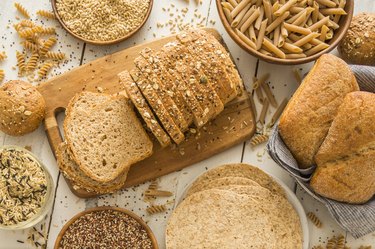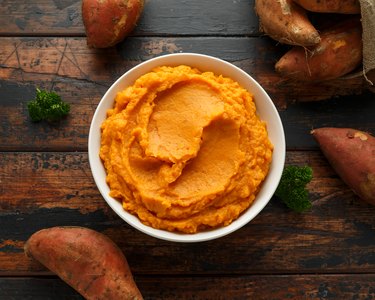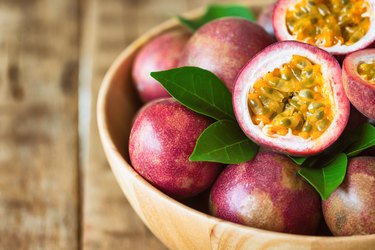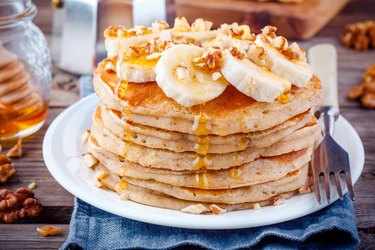
Starchy foods such as bread and pasta are often vilified, but your body actually needs some starch to survive. You'll just want to choose the more nutritious starches when you can.
Here's the lowdown on the functions of starch and what it's used for in the body.
Video of the Day
Video of the Day
Tip
Starch breaks down into sugar in your body, providing a more gradual energy source for your brain and body than simple sugars.
What Is Starch?
Starch is a type of complex carbohydrate. It comes from plants — it's made in the green leaves out of glucose (sugar) produced during photosynthesis and serves as the plant's reserve food supply, per Encyclopedia Brittanica.
It's found in a wide range of foods, including root vegetables, beans and whole grains.
Starch breaks down into glucose in your body, providing a more gradual energy source for your bodily processes than simple carbohydrates, such as refined sugar, per the National Health Service (NHS).
Carbohydrates, such as starches, provide the majority of fuel for your body, so it makes up a significant part of your caloric intake.
How Much Starch to Eat
Carbohydrates should make up 45 to 65 percent of your total calorie intake each day. For a 2,000-calorie diet, that translates to 225 to 325 grams of carbs per day. Specifically, there are no specific guidelines on the amount of starch to eat daily.
Note that dietary recommendations differ according to your personal health. If you have diabetes or overweight, talk to your doctor for specific advice.
What Is Resistant Starch?
While most starches are broken down by your body into glucose, resistant starch passes undigested into your colon, according to Johns Hopkins Medicine.
This type of starch functions much like dietary fiber. It provides nutrition for the good bacteria in your colon — acting as a prebiotic and keeping them thriving and healthy.
There are different types of resistant starch and a single food can contain multiple types of starch.
What Does Starch Do?
Starch converts into glucose to be used as energy for your body. Glucose circulates throughout your body in your bloodstream and gets taken up by cells and used as a source of fuel, according to the U.S. National Library of Medicine.
Glucose is used to power all of your bodily functions, and it's the main source of energy for your brain and nervous system.
According to the NHS, the functions of starch and starchy foods include:
- Providing your brain and body with energy
- Supplying fiber, which helps you feel full
- Supplying B vitamins, iron and calcium
Functions of Starch in Processed Foods
Sometimes, food manufacturers add starch to food products. Starch is usually added as a thickening agent but it's often used for texture, viscosity, gel formation, adhesion, binding, moisture retention and as a fat substitute, per Bakerpedia.
According to the U.S. Food and Drug Administration, you might spot it on ingredient lists as:
- Corn starch
- Potato starch
- Modified food starch
- Arrowroot
Starchy Foods
Starch-heavy foods are all plant-based because starch is a carb and carbs come from plant sources. Check out the list of starchy foods below, according to the USDA:
- Bread
- Cereal
- Rice, spelt, amaranth and other grains
- Potatoes
- Beans
- Corn
- Peas
- Bananas and plantains
- Grits
- Tortillas
- Oatmeal
- Quinoa
These foods are also rich in a range of essential vitamins and minerals, which are important for overall health.
Foods high in resistant starch include raw potatoes, green bananas and plantains. Potatoes, rice and legumes that have been cooked for long periods and then left to cool are also high in resistant starch.
Legumes, starchy vegetables and whole grains are also naturally high in fiber, which can help lower your blood cholesterol level as well as prevent constipation, hemorrhoids and diverticulosis, per the Mayo Clinic.
Most Americans do not eat enough fiber on a daily basis, so including healthy starch-rich foods is a good place to start.


